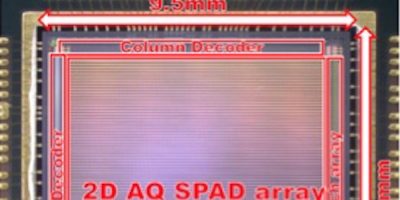Toshiba eliminates mechanical components from solid state lidar
Autonomous vehicles increasing rely on lidar systems but the mechanical components in lidar systems can add cost and occupy valuable space. Toshiba has developed a high resolution, long range light receiving technology for use in solid state lidar systems which does not rely on mechanical components and which is compact, low-cost and simple to install, says the company.
The technology is based on Toshiba’s proprietary compact, high-efficiency silicon photo-multiplier (SiPM). The company says that by removing the need for bulky mechanical components, the technology realises cost and space savings and enhances operational reliability.
In general, SiPM are suitable for long range measurement as they are highly light sensitive. SiPM’s light-receiving cells however, require recovery time after being triggered, and in strong ambient light condition they also need a large number of cells, as reserve cells are needed to react to reflected laser light.
Toshiba’s SiPM applies a transistor circuit that reboots the cells to reduce the recovery time. The cells function more efficiently and fewer are needed. The higher resolution SiPM array maintains high sensitivity, reports Toshiba.
Conventional lidar systems require mechanical components to continuously rotate the laser emitters and their accompanying optical detection devices. Field trials show that the solid state lidar, using commercially available lenses, from wide-angle to telephoto lenses, have demonstrated the system’s effectiveness over a maximum distance of 200m. This range effectively quadruples the capabilities of currently available solid state lidar systems without sacrificing high resolution, says the company.
Toshiba’s lidar system can be built with commercial lenses, which eliminates complex customisation, for application in a variety of self driving vehicles. The compact nature of the technology allows it to be placed in multiple locations on vehicles that had previously presented a major challenge and will also broaden the appeal and feasibility of lidar outside of the automotive sector.
Toshiba says it will continue R&D to further extend lidar measuring range, raise resolution and advance miniaturisation, and is aiming for a practical use of the SiPM to be available in 2022.




